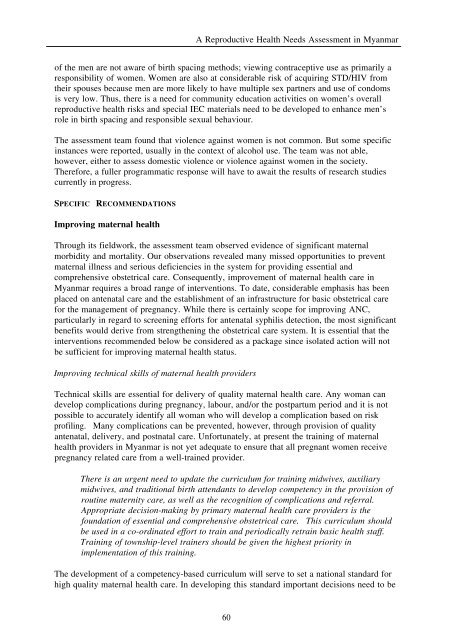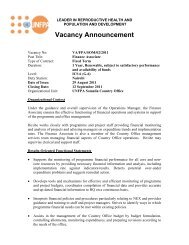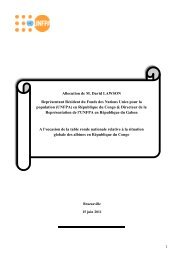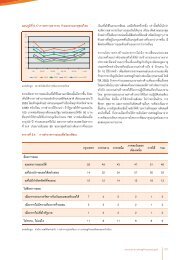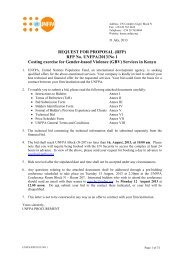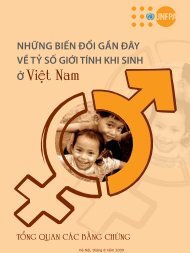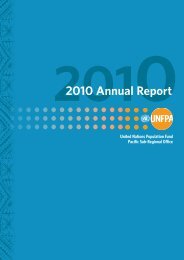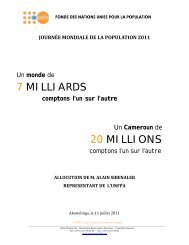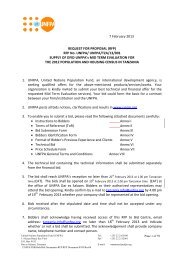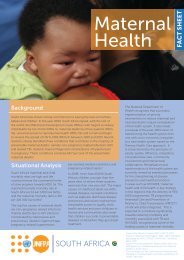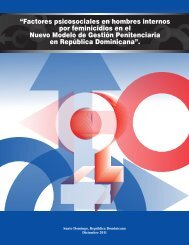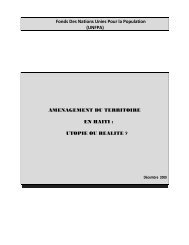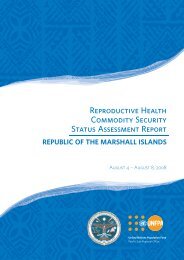A reproductive health needs assessment in Myanmar
A reproductive health needs assessment in Myanmar
A reproductive health needs assessment in Myanmar
You also want an ePaper? Increase the reach of your titles
YUMPU automatically turns print PDFs into web optimized ePapers that Google loves.
A Reproductive Health Needs Assessment <strong>in</strong> <strong>Myanmar</strong><br />
of the men are not aware of birth spac<strong>in</strong>g methods; view<strong>in</strong>g contraceptive use as primarily a<br />
responsibility of women. Women are also at considerable risk of acquir<strong>in</strong>g STD/HIV from<br />
their spouses because men are more likely to have multiple sex partners and use of condoms<br />
is very low. Thus, there is a need for community education activities on women’s overall<br />
<strong>reproductive</strong> <strong>health</strong> risks and special IEC materials need to be developed to enhance men’s<br />
role <strong>in</strong> birth spac<strong>in</strong>g and responsible sexual behaviour.<br />
The <strong>assessment</strong> team found that violence aga<strong>in</strong>st women is not common. But some specific<br />
<strong>in</strong>stances were reported, usually <strong>in</strong> the context of alcohol use. The team was not able,<br />
however, either to assess domestic violence or violence aga<strong>in</strong>st women <strong>in</strong> the society.<br />
Therefore, a fuller programmatic response will have to await the results of research studies<br />
currently <strong>in</strong> progress.<br />
SPECIFIC RECOMMENDATIONS<br />
Improv<strong>in</strong>g maternal <strong>health</strong><br />
Through its fieldwork, the <strong>assessment</strong> team observed evidence of significant maternal<br />
morbidity and mortality. Our observations revealed many missed opportunities to prevent<br />
maternal illness and serious deficiencies <strong>in</strong> the system for provid<strong>in</strong>g essential and<br />
comprehensive obstetrical care. Consequently, improvement of maternal <strong>health</strong> care <strong>in</strong><br />
<strong>Myanmar</strong> requires a broad range of <strong>in</strong>terventions. To date, considerable emphasis has been<br />
placed on antenatal care and the establishment of an <strong>in</strong>frastructure for basic obstetrical care<br />
for the management of pregnancy. While there is certa<strong>in</strong>ly scope for improv<strong>in</strong>g ANC,<br />
particularly <strong>in</strong> regard to screen<strong>in</strong>g efforts for antenatal syphilis detection, the most significant<br />
benefits would derive from strengthen<strong>in</strong>g the obstetrical care system. It is essential that the<br />
<strong>in</strong>terventions recommended below be considered as a package s<strong>in</strong>ce isolated action will not<br />
be sufficient for improv<strong>in</strong>g maternal <strong>health</strong> status.<br />
Improv<strong>in</strong>g technical skills of maternal <strong>health</strong> providers<br />
Technical skills are essential for delivery of quality maternal <strong>health</strong> care. Any woman can<br />
develop complications dur<strong>in</strong>g pregnancy, labour, and/or the postpartum period and it is not<br />
possible to accurately identify all woman who will develop a complication based on risk<br />
profil<strong>in</strong>g. Many complications can be prevented, however, through provision of quality<br />
antenatal, delivery, and postnatal care. Unfortunately, at present the tra<strong>in</strong><strong>in</strong>g of maternal<br />
<strong>health</strong> providers <strong>in</strong> <strong>Myanmar</strong> is not yet adequate to ensure that all pregnant women receive<br />
pregnancy related care from a well-tra<strong>in</strong>ed provider.<br />
There is an urgent need to update the curriculum for tra<strong>in</strong><strong>in</strong>g midwives, auxiliary<br />
midwives, and traditional birth attendants to develop competency <strong>in</strong> the provision of<br />
rout<strong>in</strong>e maternity care, as well as the recognition of complications and referral.<br />
Appropriate decision-mak<strong>in</strong>g by primary maternal <strong>health</strong> care providers is the<br />
foundation of essential and comprehensive obstetrical care. This curriculum should<br />
be used <strong>in</strong> a co-ord<strong>in</strong>ated effort to tra<strong>in</strong> and periodically retra<strong>in</strong> basic <strong>health</strong> staff.<br />
Tra<strong>in</strong><strong>in</strong>g of township-level tra<strong>in</strong>ers should be given the highest priority <strong>in</strong><br />
implementation of this tra<strong>in</strong><strong>in</strong>g.<br />
The development of a competency-based curriculum will serve to set a national standard for<br />
high quality maternal <strong>health</strong> care. In develop<strong>in</strong>g this standard important decisions need to be<br />
60


